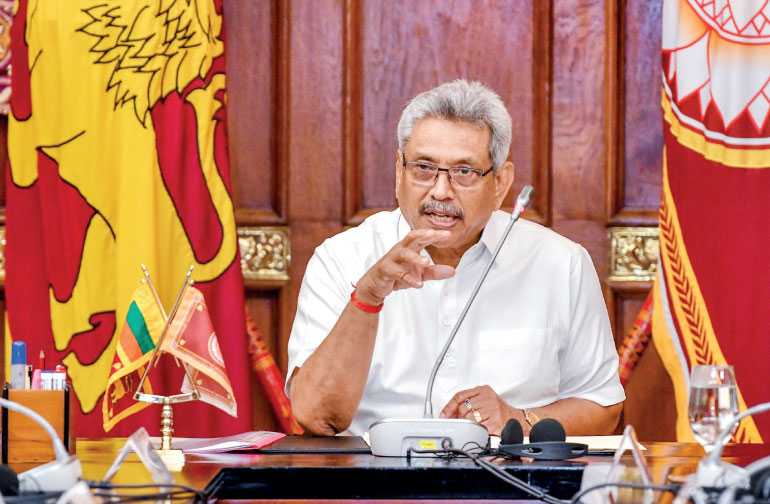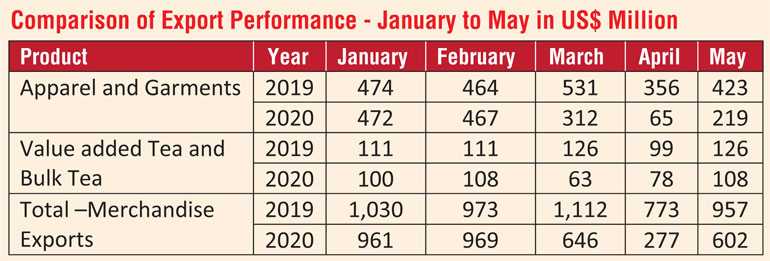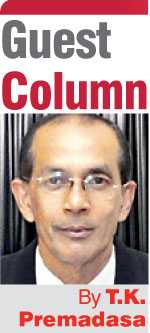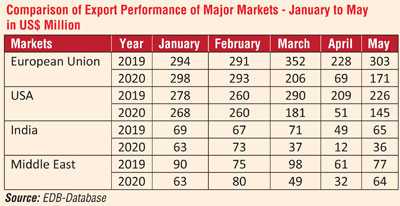Sunday Feb 15, 2026
Sunday Feb 15, 2026
Monday, 6 July 2020 00:25 - - {{hitsCtrl.values.hits}}

President Gotabaya Rajapaksa took the responsibility of this Exporters’ Forum under this uncertain situation, a gargantuan challenge to him as the new leader of the country

 The main topic among the business community these days is on the approach taken by President Gotabaya Rajapaksa to have the Exporters’ Forum held quarterly under his Chairmanship as leader of the nation.
The main topic among the business community these days is on the approach taken by President Gotabaya Rajapaksa to have the Exporters’ Forum held quarterly under his Chairmanship as leader of the nation.
The first forum under his chairmanship was officially held first week of last month at the Presidential Secretariat. The business community is highly pleased over the President’s decision to accept the Chairmanship of Exporters’ Forum because they are all confident of the commanding ability of the President to help them resolve their business issues most profitably and also his stand would be a moral for exporters at this crucial moment.
In this environment, it is more important to focus on the necessity of an Exporters’ Forum for Sri Lanka, its past operation, experience, challenges and find ways and means to manage the present situation. The concept of such forums became a popular tool for both developed and developing countries as the nature of forums create opportunities for the business community to have open dialogue with the policy makers on their issues.
Forum is a gathering of all relevant parties of specific subjects to discuss the issues and take decisive measures for solutions. Traditionally Sri Lanka had a similar type of forums in the past decades. During the early days, a team of villagers gathered in a Kawaya or Circle chaired by a reputable and knowledgeable elderly villager to find solutions to their issues.
Exporters’ Forum which became an important part of export development commenced with the implementation of so-called open economy. In the latter part of the 1970s, Sri Lanka introduced market oriented economy also known as open economy. The main objective of market economic policy was to remove the barriers in trade locally and create an export oriented economy. The main goal of creating an export oriented economy was to develop products and services from Sri Lanka to a huge global market.
With sudden change of national economic policy from import substitute policy to export oriented economy, various challenges emerged on the implementation of the new economic policy in early days of the new era. Despite regulations under bureaucracy and operational system continued by the previous administration, the situation turned worse due to various disputes. This was a common situation not only in Sri Lanka but also in other countries like South Korea who introduced export oriented economy prior to Sri Lanka. In order to face the situation, the Exporters’ Forum system was adopted by the South Korean Government as a tool for export development.
Sri Lanka also introduced the Exporters’ Forum system which is similar to the Korean model in early 1980s. Late Lalith Athulathmudali, Minister of Trade initiated the implementation of the Exporters’ Forum system and empowered Sri Lanka Export Development Board (EDB) to monitor and coordinate with other institutions on implementation of the decisions taken at the forum and also to organise quarterly.
This Exporters’ Forum is a four sided arena. Exporters stand on one side raising their issues and second and third sides, bureaucrats and key officials of support services like bank insurance, freight air lines agents sit respectively on the opposite side. At the centre was the Chairman (mostly the subject Minister) and his supporting staff. Once exporters raise their issues before the relevant authorities and they were discussed openly in trying to resolve at the forum itself or to be resolved within an accepted timeframe. If it is a policy matter the Chairman of the Forum takes the responsibility to discuss at the Cabinet level.
Powerful monitoring body
The important organ is the establishment of a powerful monitoring body to coordinate, implement and follow up the decision. It is worthy to state here that S. Kulathunga, a Senior Civil Servant being the first Director-General of the EDB led the monitoring body in an excellent manner and the Secretary of the Exporters’ Forum Chithra Mendis made a remarkable contribution in organising the first 10 to 12 forums.
The first forum was held on 22 April 1982 under the Chairmanship of Late Lalith Athulathmudali, the then Minister of Trade. The special feature of this Forum was the participation of South Korean Ambassador in Sri Lanka, Min-Gil Chung on the invitation of Minister Athulathmudali. He delivered the keynote address sharing the Korean experience on conducting Korean Exporters’ Forums.
All Forums chaired by late Minister Lalith Athulathmudali brought fruition through his commanding ability. Since then every forum held was only a platform for discussions and delivery of speeches with no constructive decisions for export development. Even the 14th and 15th forums chaired by the late President R. Premadasa brought no progressive results but mostly the speeches delivered by various authorities. These Forums became a fiasco due to no proper leadership and guidance. On certain occasions, the Deputy Minister or Junior Minister or a high rank official chaired the Forum. But unfortunately no positive solution was found against the issues.
The present crucial situation cannot be compared with previous situations as this is totally a different scenario. This COVID-19 virus became a global pandemic including in Sri Lanka. The emergence of the crises of each country is different from each other. But the crises have adversely affected the entire world trade. The World Trade Organization opines that world trade will fall by 13% to 32% in 2020 and also the WTO estimates the expected recovery in 2021 is equally uncertain.
The buying pattern has changed in moving to prioritise the buying of merchandise. On the other hand, freighting goods has not come back to normal. According to global update on COVID-19 Sri Lanka’s major markets USA and EU are considerably affected.
During the last three months (COVID-19 affected period) Sri Lanka exports dramatically decreased compared to same period in 2019. The current situation is liable to affect not only economy but also social factors of the country as well.
President Gotabaya Rajapaksa took the responsibility of this Exporters’ Forum under this uncertain situation, a gargantuan challenge to him as the new leader of the country. It is expected to reap a fruitful harvest by a thorough monitoring under his visionary guidance and elevate the export trade during this year.
According to print media, most of the exporters highlighted their issues related to their individual sectors at the Exporters’ Forum held in first week of this month. E.g. the tea exporters requested importation of packing materials needed for their tea industry. Seafood exporters pointed out issues on freight charges, etc. Institutions responsible for export development showcased the orthodox argument to diversify the market and products. Proposals presented at the Forum prompted the Cabinet to reduce tea marketing levy on exports.
Export Development Plan
Exporters’ Forum should also discuss the master issues applicable to the entire export sector. The World Trade Organization clearly indicates that recovery of world trade as that of 2012 is uncertain. Therefore, the plans designed before the spread of COVID-19 have much less value. As the Government Apex body for Export Development, EDB is authorised in terms of its Act to formulate a five-year national export development plan every five-year period and monitor it. The five-year strategy under the Export Development Plan launched in 2018 projected to reach its goal of $ 28 billion in exports by 2022. It expected benefits from the input of more than 600 public and private-sector stakeholders across Sri Lanka to reflect their exports. However, it became a display of unrealistic assumptions.
In considering the present situation, the National Export Development Plan must be re-written with proper strategies analysing the real trends in global need. In this context, it can be designed as a short term plan because the international organisations highlight priority to keep supply chain for essential items like medical supplies, food products and ICT goods and services. It must be based on short term strategies to clutch opportunities created with the situation. Best example is supply of surgical gloves and masks. China, the main world supplier of masks and gloves had a huge dearth of supply within the country and they stopped the exports. But now they have increased the production of masks and surgical gloves in order to recover their lost markets. However, they were not able to touch the USA market which has a massive demand due to political conflicts, while a country like Vietnam has taken the advantage. Even though Sri Lanka is capable to supply quality surgical gloves and masks with competitive prices, our difficulty is supply capacity. One of the other product sectors that has opportunity is tea. The authorities responsible for export development should call upon all exporters and stakeholders and develop a short term plan instead of five-year plan without further delay considering the global tendencies.
On the other hand, new tariff barriers may be enforced during post-COVID-19 for supply chain of export products especially for food items. Organisations WHO, WTO and EU could introduce new GMP systems. It can be called new certificates on various practices such as the staff wears masks and gloves or any other protective device and also could advise to increase methods on less human involvement, etc. The steps intended to be taken should be highlighted on future tendencies.
It is important to invite all supply services to the Forum, specially the freight agents and Bank Insurance, etc. as most exporters use passenger flights. Sri Lanka exporters mainly used the passenger flights for their cargo purpose. Cancellation of flights, closure of airports and slow operational systems at airports caused undue delays in exports. Increase of freight charges by shippers also was another issue that was confronted. However, problems of this nature are out of control. But the initiative taken to convert passenger flights to cargo flights by the national carrier is a timely encouragement.
This is the first time that Sri Lanka’s export sector faced a challenging situation. Therefore, it is highly important to open particularly a funding system in resolving similar situations. Sri Lanka had similar funding systems established under EDB Act called Export Development Fund. Funds of this nature are not found in most of the countries. The fund is mainly collected from the levies imposed on imports and it is solely utilised for export development activities.
In 1980 under the Export Expansion Grant Scheme, a large amount of non-refundable grant was disbursed to exporters in a bid to strengthen this fund is an indication. In 1983 during the disturbance period, this Fund was very helpful in sorting out the difficulties faced by exporters. In 1994 Treasury took over its control utilising the funds for other activities including social benefits. Supposedly, this is the finest opportunity to re-organise Export Development Fund in view of such an eventuality in future.
If Sri Lanka had EDB fund in operation, how beneficial would have been at this crucial time. In the circumstances, it is proposed to reorganise this Fund with national priority as a precautionary measure to meet any future challenge in exports. However, after the discussion the President had with Central Bank, the approval of a loan to the tune of Rs. 28 billion on very low interest rate even after three months is greatly appreciated.
Monitoring Board
Most important part of the Exporters’ Forum is the implementation of the decisions taken by the Forum. It is needed to follow up if the proposed benefits are duly granted to the exporters. Hence, the necessity of a Monitoring Board is highly significant to follow up the progress. The role of the Monitoring Board should be to improve interlink with relevant parties and continue communication until the issue is finally settled. E.g. if any exporter has an issue with banking or freight, the Monitoring Board should follow up if the relevant bank or freight institution has taken action as agreed at the forum.
It would be effectively favourable if the Monitoring Board functions under direct supervision of the Presidential Secretariat. It is suggested that the Monitoring Board may be equipped with representatives of relevant ministries, boards, corporations and representatives of chambers and the private sector. EDB as the key government institution for export development will be competent to be the Secretary. No fruition of the Forum can be achieved without experiencing a monitoring system.
In conclusion, it is worthy of reading the full text of the speech delivered by South Korean Ambassador Mil Gil Chung, one of the architects of export development in South Korea at the first forum held in 1982. In his speech he highlighted how they achieved success among the poorest nations in the world. In his words: “The prime reason for success of Korean great achievement through exports is the strong guidance and direction from top or the President of South Korea.” Successive Presidents themselves have encouraged trade industrialists and workers to achieve profitable goals by taking part in Forums by themselves. Now the fast development under these leaderships has been described as the Miracle of the Han River by the world.
It is a remarkable display on the Policy of President Gotabaya Rajapaksa to take over the Chairmanship of Sri Lanka Forum boosting export sector for long term benefits. This is a signal for a brighter future for exporters towards progressive approach to their business that will help build the economy of the nation.
(The writer is the former Head of Corporate Affairs and Communications of Sri Lanka Export Development Board. He can be reached on [email protected].)